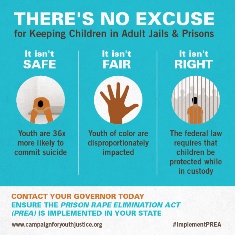
Last year, Gov. Rick Perry, refused to complete a process to bring Texas into full compliance with the Prison Rape Elimination Act (PREA), saying it would result in unfunded mandates for local sheriffs and a reduction in prison guards. The actual gap between where Texas is and where it needs to be is relatively small, but the problems that remaining noncompliant will create for the state- including increased possibility for litigation and a loss of federal grant money - could be substantial.
Gov. Perry is just one example, in one state that magnifies a larger problem.
Over a decade ago, the U.S. House of Representatives unanimously approved PREA, a bill designed to end sexual violence behind bars. The passage of PREA was a bipartisan effort, signed into law by President George W. Bush, also a former governor of Texas. U.S. Department of Justice officials worked tirelessly to write and issue regulations in 2012 to implement PREA through several comment periods.
Now is the time to ensure that all states are in compliance and the U.S. Attorney General and the nation's governors need to devote their attention to enforcing this law. Today, Governors from across the country will once again provide information to the Department of Justice as to whether the state will be in compliance, or continue working towards full compliance.
What's at stake if PREA is not enforced?
For starters, the safety and well-being of the approximate 100,000 children placed in adult jails and prisons every year.
These children include Ameen, incarcerated in adult prison as a teen, who wrote CFYJ a letter stating that he witnessed a 14 year old being sexually assaulted by three other inmates, and Antonio, sent to adult prison at age 17, who wrote to us about his experiences stating that, "I came to prison so young; sexual advances were made toward me. I had to defend myself the best way I knew how, which was to fight." And these children include Rodney Hulin, sent to adult prison at 16, repeatedly raped and died by suicide. Unfortunately these stories are more common than we recognize and youth are 36 more times more likely to commit suicide in an adult jail than in a juvenile detention facility.
To protect children, the PREA regulations include the Youthful Inmate Standard that bans the housing of youth with adults, prohibits contact between youth and adults in common areas, and ensures youth are constantly supervised by staff. At the same time, the regulations limit the use of solitary confinement in complying with this standard. Enforcement of the Youthful Inmate Standard is just the baseline for safety, and we need to encourage our jurisdictions to go further to ensure that no child is victimized in a detention facility.
Governors and local officials should implement the best practices to fully protect youth in the justice system. Best practices include removing youth from adult jails and prisons, and instead placing them in juvenile detention and correctional facilities where they are more likely to receive developmentally appropriate services, educational programming and support by trained staff.
States that need assistance should consult other states that have already adopted policies to keep children out of adult jails or prisons, such as Colorado, Indiana, and Virginia. States can also seek federal technical assistance through the U.S. Department of Justice sponsored centers such as the National PREA Resource Center and the National Center for Youth in Custody and apply for federal grants from the federal Bureau of Justice Assistance (BJA).
Thousands of individuals and organizations in nearly every state have called on the U.S. Attorney General and the nation's governors to ensure that children are protected from the dangers of adult jails and prisons through the PREA.
Since PREA was passed, an estimated one million children have cycled through adult jails and prisons. Unfortunately, the PREA came too late to impact these childrens' safety and well-being. Now is the time for the U.S. Attorney General and the nation's governors to fully implement this law and protect our children.